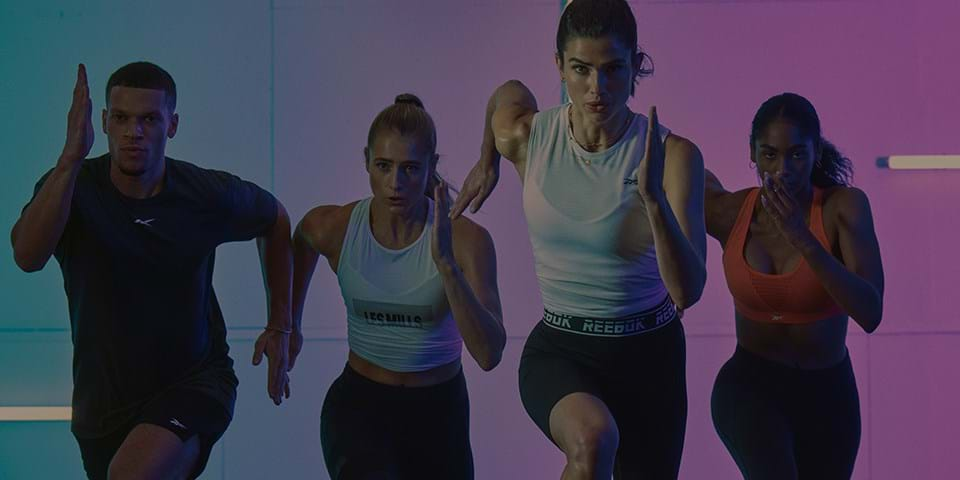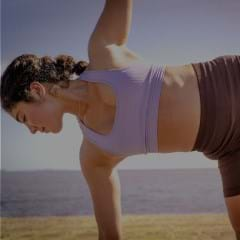Emma Slade is an Australian Exercise Psychologist who works with everyone from pro athletes and keen gym-goers to people battling depression and struggling to get up off the couch.
She says when it comes to getting the maximum benefit from exercise, most of us consider a good mindset equally as important as physical abilities. Yet, chances are we spend plenty of time chasing physical fitness gains and nowhere near as much working on getting our mindset in good shape.
This doesn't mean we should all down tools (or in this case barbells) and switch our focus entirely from muscles to mental fortitude. But exercise psychology offers key things to consider when it comes to building a strong mental foundation for any physical activity you pursue.
How can exercise psychology help you?
Emma Slade: “When people think of sports and exercise psychology they think of elite athletes, and a lot of exercise psychologists work in this space. But I have always wanted to work with the everyday person and help them establish their own healthy relationship with exercise. Everybody knows exercise is good for them. So simply slamming people with more of this knowledge isn't necessarily going to promote long-term change. "I just can't get going today. I'm not motivated. I don't feel like it." are all statements with both physical AND psychological roots. Exercise psychology focuses upon the latter.
Confidence, perceptions of self, or previous experiences around exercise are just some of the other mindset barriers that get in the way of exercise. A lot of what I do is work with people to overcome these barriers. It's a classic statement that if exercise was a pill it would be the most widely prescribed medicine out there. However, even though we have this beautiful thing we could all use in various capacities for overall wellbeing, a lot of the population don't. And that’s where the psychology component comes into it. There’s no specific fitness formula that will work for everyone, it’s about working one-on-one and using psychology to explore what works for the individual.

Will you only benefit from psychology if you’re dealing with ‘issues’?
“Seeing a psychologist still, unfortunately, has a stigma associated with it but you can work with a psychologist for multiple reasons. Yes, as a psychologist, you work with individuals experiencing mental health concerns and assist people to overcome some of the hardest and most challenging parts of their life. But it's not all about being at rock bottom. It’s also so much about potential. A massive part of psychology is increasing wellbeing and performance that’s already good and making it better. Not everyone experiences a mental illness in their lifetime, but we all have mental health and psychology works with both.”
Today we have a real hustle mentality. We have access to all sorts of tools and resources to help us be our best and rule the world, but should we strive for that?
Is always pushing to be your best important?
“It’s important to check where your desire to achieve more is coming from. If you’re a driven person and you have a real growth mindset, where you want to face challenges and overcome barriers, that’s great. But if wanting to go hard, be better and be stronger is coming from a place of comparison, a place of self-judgment, or a place of punishment, then that’s something to be wary of.
Today we have a real hustle mentality. We have access to all sorts of tools and resources to help us be our best and rule the world, but should we strive for that? There’s nothing wrong with accepting where you’re at. And if you’re truly happy there, then stay there.”
You don’t focus on losing 10 kilos, you focus on the process, and when you engage with that process, it is a high likelihood you will lose the weight anyway.
Does this mean goal-setting is not as important as we once thought?
“Research shows when it comes to behavior change, self-monitoring of behavior, not a pure focus upon the intended outcome, is key. So goals are valuable, but they must be behavioral-based, not outcome-based.
For many, setting a goal to lose weight can be a great motivator, but what’s important is the difference between process and outcome. This means you don’t focus on losing 10 kilos, you focus on the process (eating well, exercising, prioritizing sleep, managing stress levels). When you engage with that process, there’s a high likelihood you’ll lose the weight anyway. By focusing on the process, you promote the likelihood of finding a form of exercise that doesn't feel like a chore and you do it because you enjoy it.
It’s important to note that most people are actually very good at losing weight. But if you’ve only been focused on the outcome of losing weight, and the process hasn't been overly enjoyable, meaningful, or fulfilling, then you are probably going to put the weight back on.”
Feeling anxious about exercise can kick in whether you’re super fit or if you’re just starting out. Is exercise anxiety a bad thing?
“You don't want to eliminate anxiety from all aspects of life, because anxiety has a purpose. Anxiety is our body perceiving physically threatening or emotionally frightening situations and alerting you so that you can effectively deal with them. Anxiety becomes dysfunctional when it's telling you that absolutely everything is threatening, even when there is no rational reason to be anxious. The interesting thing about anxiety and exercise is the physical sensations associated with each are very similar. Your heart rate goes up and you may feel hot, you feel sweaty, you're experiencing shortness of breath. So if you're already feeling anxious about exercise, and then you start to exercise and you further experience these sensations, it can be hard to differentiate what is anxiety and what is a by-product of exercise. A large part of a sport and exercise psychologist’s work is helping individuals to learn how to differentiate these physical feelings and unpack the thoughts and behaviors that may promote anxiety and influence future involvement in exercise.
How can anxiety impact your exercise experiences and the results you get?
“There are some who have quite traumatic associations with exercise. For example, a client who was a strong swimmer in her teenage years. The motto on the swim club wall was 'Go hard or go home' which instilled the idea that unless you're going hard you may as well not bother. So, when she was considering exercise as an adult it was anxiety-provoking and negative. For others, anxiety can come from not feeling comfortable or connected with your body, confident in your skills, or that you have the support around you to start exercise.
It also works at the other end of the scale, where someone finds something that works for them really well, but like a lot of things, when you do too much it becomes dysfunctional. What we’ve seen lately, is that for some, when the world seems to be falling apart, it can feel like the only thing you can control is how much you eat, and how much you exercise. People tend to grasp on to exercise in order to grasp some control, which is great, but then that's also the space where anxiety and exercise dependency and overtraining can kick in.”
You have legitimate reasons for struggling to exercise, but you can work with that and navigate around it.
Is laziness a thing? Why do we make excuses to exercise? And is it bad?
“Some people are just naturally more wired to be active and some aren't. As adults, it's easy for us to just say, 'I'm just lazy', but that's a massive overgeneralization. Our lives are all busy in different ways. You might have five kids, run your own business, juggle financial concerns, and on top of all of that are just trying to get through each day. Or you may have a seemingly smooth day-to-day work life and routine, but are experiencing a mental health concern that consumes a lot of your space. In both situations, it's easy to blindside exercise from the list. It's not that you're being lazy, you're understandably occupied in other areas of life. You have legitimate reasons for struggling to exercise. I'm always very quick to challenge a client’s ‘excuses’ for not exercising – are they actually excuses? Often they are real and valid reasons, other times they are just excuses. But when we get clarity on this we then work together to explore the motivation to change – we acknowledge the process to becoming an ‘exerciser’ won’t necessarily be linear as we navigate that process of change, and that’s okay!
The process to becoming an ‘exerciser’ won’t necessarily be linear … and that’s okay!
3 STEPS TO CREATE POSITIVE, ENJOYABLE LIFE-LONG EXERCISE HABITS
“Firstly, accept where you’re at. Don’t compare yourself to others. Yes, you can look to others for motivation and inspiration, but remember they could be at day 100 and you’re just at day one. Emotionally, it’s hard if you’re not happy where you’re at in regards to your health, your body image, your fitness levels, your life. But comparison is not helpful. We need to be more accepting and compassionate towards ourselves. This can be a really challenging concept if your motivation for change has only ever come from a place of negativity or self-loathing”
“If you think you don't like exercise, that's okay, but lean into that thought and feeling. And start exploring what you might enjoy. Go home and ring every gym, studio, and exercise offering in your area and start a free trial. Or take up those free online program offers or videos and try them in your living room. Acknowledge the thought that yes you may not like this exercise, but allow the behavior of trying it to really clarify if you do or do not. Try everything just once and think … how did you feel before the exercise, how did it feel during, and how did you feel afterward?”
“Then, if you really can't find something you enjoy, think about it in different terms. Can you find a type of movement that you like? You don't necessarily need to love it. Often we do things that don't bring us immediate enjoyment, like cleaning the house, but in the end, we stand back and think, 'Wow, I'm glad that's done'. For some of us, exercise is one of the most enjoyable and meaningful parts of our lives. But if it's not, then try and think about how you can tie exercise habits into meaningful parts of your life. Perhaps it's being active while spending time with family or as a source of social connection with friends. Exercise could be a source of ‘me-time’ or a means of feeling competent. Finding what gives movement meaning and value in your life promotes a lifelong relationship with exercise.”

Emma Slade is an Australian Registered Psychologist and Sport and Exercise Psychologist. Her passion is the psychology behind movement, exercise, and physical fitness. Through her practice, In Motion Psychology, she works with individuals wanting to overcome psychological barriers to exercise, everyday exercisers who want to take their physical activity to the next level, through to those who want to reach their peak performance in competitive training, exercise, and sport domains. She additionally consults with fitness trainers, gyms and studios, and the fitness industry regarding how to help promote a positive relationship between clients and physical activity. Emma's published research explored how group exercise instructors can use social Identity leadership to positively influence participants ongoing attendance to the class and physical effort within the class. In addition to her client and consultancy work, Emma teaches at the Australian Catholic University in the areas of exercise, health, and lifestyle counseling.
inmotionpsychology.com









